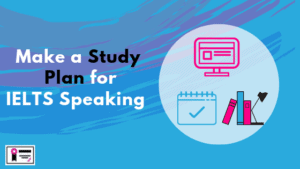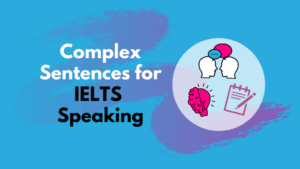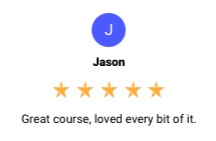How to speak confidently in the IELTS speaking test is the number one challenge for many students.
So, how do you do it?
Well there are things you can do when studying before the test, and there are things you can do during the test.
Let’s look at both.
Table of Contents
How to gain confidence BEFORE the IELTS Speaking test
Start easy
Confidence comes from small successes, built continuously over time.
So, start practicing speaking from an easy level.
Imitation is a good place to start – it builds pronunciation, vocabulary, grammar.
How do you do it?
- Begin repeating phrases from a low level audio/video (don’t read, listen!).
- Repeat and change a word.
- Repeat and change 2 words
- Choose more and more difficult audios to practice with.
For example, listen to this sample.
The first sentence is
I live in London and I have lived here for around 5 years
Now choose ONE word and change it. Let’s change LONDON for BEIJING. Now say the sentence, but try to keep the same intonation and rhythm as the original.
I live in Beijing and I have lived here for around 5 years
Now change another word. For example, let’s change 5 YEARS for 3 MONTHS.
I live in Beijing and I have lived here for around 3 months
Continue like this, with other sentences and also with other audio/video files.
This is a simple technique, but it develops pronunciation, consolidates grammar, and builds flexibility.
All of which will start to build your confidence.
This is just imitation but it is the foundation and a great place to start today.
Practice a little, everyday.
Push your comfort zone
We can also build confidence when we face our fear
Many students have 3 big fears.
- Speaking out in front of others
- Making mistakes
- Other people laughing at their English
In fact all 3 are interconnected!
We build confidence when speaking English every time we face our fears.
When we speak out and make mistakes, then actually we see how we grow and improve.
We can face these fears, by pushing ourselves out of our comfort zone.
How can we do this?
Well, it’s easy to practice repeating at home alone, but you also need to practice with other people.
So, you can find a teacher or a speaking partner online. Or you can practice with other friends who can speak English.
Where can you find speaking partners and teachers online?
To do that, try one of the services below.
https://www.italki.com/en/affshare?ref=IELTS
Pay per hour, professional teachers and community tutors (the latter are generally cheaper), user-friendly platform, good sense of community .
Specialise in teaching English, all teachers are native English speakers, pay on a monthly basis, can record classes to playback.
Language exchange, so you teach someone your language and they teach you theirs. It’s free. Mobile app – chat based (so texting and audio messaging). Group chats possible. Find partners worldwide.
______________
Take one small step.
Decide to do it today. Don’t wait.
Connect with one person and start speaking.
Even just for 5 minutes.
Push the comfort zone.
Prepare for the IELTS Speaking test well
I learnt this one when I had to become a presenter and give academic presentations for work.
So, the more you prepare, the more confident you may feel.
A good way to prepare is to practice answering common IELTS questions.
Practice, don’t memorise.
You know the key to getting a Band 7 is to show FLEXIBILITY.
How can you build your flexibility?
Simple, practice answering the PART 1 questions, BUT don’t practice giving the same answer.
Practice answering the same question 3 times, but each time, make sure you give a different answer!
This is how you start to build flexibility.
Find part 1 questions here

Use a mask
When we speak another language we sound different, and may even look different.
Many speakers of other languages feel like they are a slightly different person when they speak another language.
Almost like they are wearing a mask.
This is a powerful feeling that you can use to speak English with more confidence.
If you are shy or nervous, this can disappear behind your mask.
Use your mask, not to hide, but to show the kind of person you want to be when speaking English
…a confident speaker of English.
Become an English SPEAKER
Confidence is identity
For me, Identity is at the heart of this problem.
Many students see English as a subject outside us.
Actually it’s not outside us, it’s a part of us.
Even with little English, we use it to…
- give opinions,
- say what we feel,
- say what we like,
- shout when angry.
Of course it is a part of us!
When we see our identity not as just ‘English students’, but as ‘English speakers’ everything starts to change.
Of course, we need to
- keep studying
- keep practicing speaking.
- keep improving our skills.
We can also get a teacher or speaking partner who can encourage us.
However, psychology is at the heart of confidence, and I think creating a new identity as an ‘English speaker’ is a great first step.

Forget the 'native-speaker'
Don’t compare yourself to the ‘native-speaker’.
Don’t try to be like a native speaker.
Accept where you are, and then start building from there.
Don’t lose yourself.
Be yourself.
You can be shy, quite, loud, nervous.
Just be you and let your English identity grow.
That’s fine.
Develop the skill of confidence when speaking English
Confidence is something we have to practice
Have you noticed what happens when people say – ‘don’t be nervous’ – it usually doesn’t work.
Not straight away.
However, we never say to people – ‘just play the piano’ – you can’t, you need to practice!
Well, with confidence it’s the same. Confidence is a skill we need to develop.
You can develop your confidence in speaking English by practicing all of the above things.
The key thing is to keep at it. It won’t happen overnight, it takes time.
Be patient, and keep going!
How to speak confidently DURING the IELTS Speaking test
Pretend
Now, the quick solution to speaking confidently in the IELTS Speaking test is to fake it, till you make it.
Pretend you are confident, and your mind will begin to believe it.
Close you eyes and visualise yourself speaking confidently.
Sometimes this works, and if it does, great!
Keep it simple in IELTS Speaking Part 1
At the beginning of the test (The introduction of part 1), you want to keep your answers simple and accurate.
If you start trying to use complex language at the very beginning of the test, you put extra stress on yourself.
This will usually cause you to make mistakes.
Mistakes early on do not create a good first impression.
Keep it simple a the start.
Short answers of maybe 3 to 4 sentences.
You will have lots of opportunity to show off more complex language in Part 2 and 3.

Smile in the IELTS Speaking test
When we are nervous, we don’t naturally smile.
However, when we smile, our bodies release endorphins and we automatically relax.
This helps us naturally feel good and can help just a little to boost our confidence.
So when the examiner begins Part 1, Part 2 and Part 3 – use those gaps to smile.
It will help.
I hope all of this tips, will help you eventually grow to be a more confident speaker.
Which tip do you find the most useful? Let me know in the comments below!






10 thoughts on “How to Speak Confidently in IELTS Speaking (updated 2023)”
Pingback: 5 Tips to Increase Your CONFIDENCE in English – Video Tube
In my opinion, this is not only for IELTS candidates. This is a tool for everyone who are struggling when speak in English and I would like to thank you for introducing these kinds of instructions to us like students who are trying to learn English.
I completely agree – thanks for commenting and glad you like it.
i feel more confident thank you
Great- my work is done!
Which tip do you find the most useful?
Smile😊😊😊😊😊😊😊😊
very useful information and help me a lot . thankyou so much sir
U r really great.
Regards
Nusrat zehra Ansari
Thank you so much!
You are amazing
Thank you!